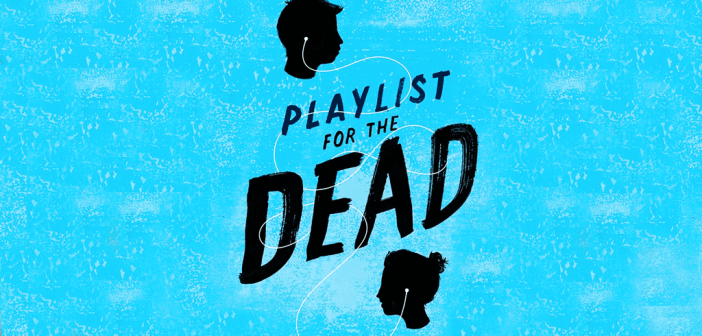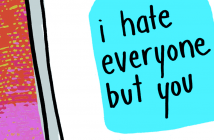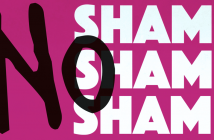 Backlist Bonanza offers a look at books published more than two years ago that are worth a read or a re-read!
Backlist Bonanza offers a look at books published more than two years ago that are worth a read or a re-read!
Michelle Falkoff joins us today to talk about her 2015 book Playlist for the Dead, the devastating yet hopeful story of a teenage boy who learns to keep living after losing a close friend.
In Playlist for the Dead, there was a party, there was a fight, and the next morning, Sam’s best friend, Hayden, was dead. All Hayden left Sam was a playlist of songs and a suicide note: For Sam — listen and you’ll understand. To figure out what happened, Sam has to rely on the playlist and his own memory. But the more he listens, the more he realizes that his memory isn’t as reliable as he thought. And it might only be by taking out his earbuds and opening his eyes to the people around him that he’ll finally be able to piece together his best friend’s story. And maybe have a chance to change his own.
Playlist for the Dead is available now.
Suicide is such an important subject to discuss, and yet it’s often difficult to find the words to talk about it. What inspired you to tell this story? Why did you choose to tell it from Sam’s perspective?
I’d recently read a couple of books that dealt with suicide in which teenage boys dealt with the loss of girls they had romantic feelings for (13 Reasons Why, Looking for Alaska), and while I really enjoyed those books, in some ways they emphasize what the boys missed out on by losing the girls before the relationships had fully developed. I was more interested in exploring how someone might deal with the loss of something long-standing and that the narrator thought he understood really well, even if he turned out to be wrong — kind of the opposite approach. I picked Sam because I wanted to emphasize the feelings of the person doing the losing, not the person who makes the decision to go, and (even though it makes readers angry) I knew I wanted the playlist to send him out looking for answers and talking to people, even while it provides no answers itself. It was really important to me to get across that Sam might never know for sure why his friend made this choice, because only in the rarest of circumstances are things ever that clear.
How does it feel to look back on a story you wrote years ago? Has your perspective on this book evolved with time?
It’s strange, honestly. It was even strange when it came out — it hadn’t sunk in how much time elapses from finishing the book to publication, and the impact of that time gap. The book has only been out for a couple of years, but I started writing it five years ago, and a lot has changed in that time. My perspective on the book has shifted somewhat — the Netflix adaptation of 13 Reasons Why has gotten me back to thinking about why I wrote it in the first place. While the adaptation is impressive, there are issues it raises for me that are beyond what I remember feeling about the book, and watching it has made me feel better about refusing to give real answers about why Hayden committed suicide. (Though I guess that means the book wouldn’t make for a fabulous TV show. Oh well.)
How have readers responded to Playlist for the Dead? Does the response of readers impact you as a writer?
I’ve gotten some really lovely emails from readers, and a lot of them are in Hayden’s position rather than Sam’s—they’re struggling with school or family or friends or depression, and they find him to be someone they can relate to. I hope they make different choices than he did, and particularly I hope they find people they can talk to before they think about harming themselves in anyway. I try to encourage that when I can. Reader response definitely affects me as a writer in that I think about how the book might affect those who read it; I can’t focus too much on things like reviews (especially Goodreads reviews) or I’d just throw in the towel, since those sites only clarify how difficult it is to please everyone all at once.
The playlist Hayden leaves behind features a wide range of musical styles, and Sam struggles for much of the book to understand its meaning. How did you arrive at this particular mix of songs? Are any of the songs especially meaningful to you?
I struggled! At first it was a straight-up suicide mix, with lots of heavy metal and depressing boys with guitars. But the music wasn’t great, and the mix didn’t hold together. Then I decided to change approach, to have the playlist be songs that either triggered memories for Sam of his friendship with Hayden or that hinted that Hayden was getting music from somewhere else, and that in turn sent Sam looking for the friends he never knew Hayden had. It was super fun once I thought about it that way. Some of the songs are definitely functional in that they worked well for what I was trying to get across; others are songs that I really love. I am an obsessive fan of The Decemberists and have been for years, so there was no way I’d make a playlist without them on it. I’m also really into The Neighbourhood, Florence and the Machine, and The National, so it was great to be able to put those songs on there.
Has your approach to writing changed since this book? If so, in what ways? If not, what has stayed the same?
Some things have changed; others stay the same. My early drafts are still a mess while I figure out plot; my later drafts are still a mess while I figure out character; my end-game drafts are still really difficult while I figure out how to make plot and character align and intersect and work together. What’s changed is that now I believe it will happen, whereas early on I could never be sure.
What have you worked on since this book? Can you share any details about your current projects?
My second book, Pushing Perfect, came out last year, right before the election. I think we’re in a time period where people aren’t feeling passionately about fiction, and I’m certainly not feeling passionately about book promotion—it’s sad, because I really enjoyed working on this book, and I’m hoping someday when things die down a little it might have a second life. Right now I’m working on a book called Questions I Want To Ask You, about a boy who spends his life thinking his mother’s dead and then gets a letter from her on his eighteenth birthday.
Do you have any advice for new writers on the twists and turns that a career in publishing can take?
Keep writing. It sounds overly simplistic, but I have a lot of writer friends, and while talent is always a factor, the real difference between those who have writing careers and those who don’t is that the ones who have careers kept writing. That’s pretty much it. Perseverance is everything. Or mostly everything.
Who do you hope will find this book?
I’m really glad people in Hayden’s position have found it and that it’s been helpful to them, but to be honest, I wrote it more for kids like Sam. It’s difficult to be someone whose friend is suffering, and to find out later on that you didn’t know the extent of it (or didn’t know at all) can be really traumatizing — there’s a tendency toward self-blame that’s both entirely understandable and also potentially damaging, and I wanted to explore that in a way I hoped would be helpful.
What else would you like readers to know about Playlist for the Dead?
It’s not as depressing as it sounds! (I always say that when I’m describing it because I feel like it comes off as super dark in theory but I don’t think it’s nearly as dark on the page.)




